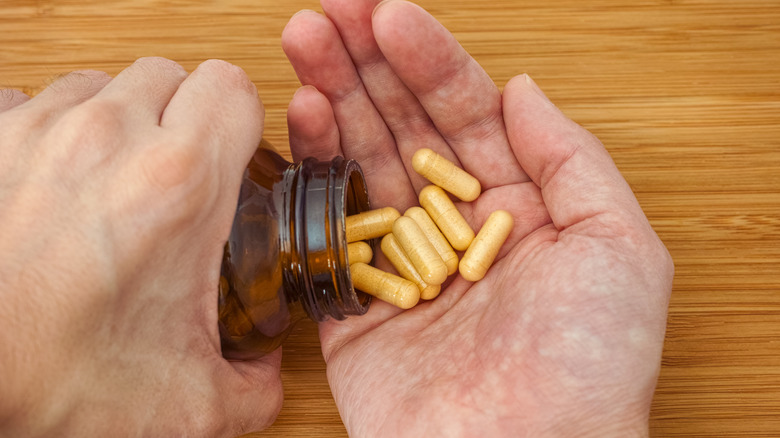Vitamin B6 Vs B12: What's The Difference?
Someone may have recommended that you begin adding a B vitamin into your diet. Now you're at the pharmacy and are faced with both vitamin B6 and vitamin B12. Which one do you need, and what's the difference?
Both these supplements are part of a group of eight vitamins known as the B complex, according to SFGate. B6 and B12 are the ones we hear of most commonly. Both are stored in the liver, with excess B6 flushed out of the body through urine. B12 deficiency is common as we age since the body uses up its store, and most people don't supplement enough to replenish it, according to Livestrong.
Both these B vitamins contribute to red blood cell production, but they have individual functions as well. B6 is a key element in maintaining hormone balance in the body and limiting the negative effects of hormones as they move through the system. Vitamin B12 plays a role in a healthy nervous system by promoting the production of myelin, a sheath that protects nerves and conducts electrical impulses (via WebMD).
Here's how much B6 and B12 the body needs
When a person has a B6 deficiency they may notice it in their mood. Vitamin B6 is involved in the production of gamma-aminobutyric acid (GABA), which helps control depression, anxiety, and pain (via Healthline). B6 also contributes to the production of serotonin, which contributes to mood stability.
B12, on the other hand, may boost your memory (per Healthline). Decreased B12 has been associated with conditions like dementia and Alzheimer's, so people developing these conditions are often advised to supplement with B12.
You don't need much B12 to maintain health. The National Institutes of Health Office of Dietary Supplements recommends just 2.4 micrograms for adults per day. Women who are pregnant should get 2.6 micrograms and those who are lactating need 2.8 micrograms. It's available in foods like meat, poultry, milk, and some fortified foods like cereal.
For vitamin B6, the OSD advises 1.3 milligrams for adults up to age 50. After age 50 women should strive for 1.5 milligrams and men for 1.7 milligrams. Pregnant women need 1.9 milligrams and breastfeeding women should get 2.0 milligrams. It can be found naturally in foods like poultry, fish, organ meats, potatoes, and other starchy vegetables, and non-citrus fruit.
How low levels of B6 and B12 can affect your health
Those low in vitamin B6 include people who smoke, have an alcohol use disorder, are obese, pregnant, or have autoimmune, kidney, digestive, or liver diseases (via Healthline). Since the vitamin helps the body use collagen, a deficiency in vitamin B6 could create an itchy red rash on your face, neck, scalp, or further up in the chest. Some may develop glossitis, a condition where your tongue becomes inflamed, swollen, sore, smooth, or reddened. For others, their immune systems could become impaired due to a decrease in the creation of antibodies, which the body needs to fight infections. Your lips might become cracked, red, and swollen, a condition known as cheilosis, which is seen in those with low levels of B6. It's also common to feel more tired than usual, experience seizures, or have tingling pain in your hands, arms, feet, and legs.
Individuals with low levels of vitamin B12, on the other hand, lack good red blood cells (per Johns Hopkins Medicine). People at a higher risk include those who eat a vegetarian diet, have a family history of it, older adults, or experience conditions, like an autoimmune disease, Crohn's disease, or HIV. While symptoms will vary, you might experience nausea, weight loss, muscle weakness, tingling or numbness in your hands and feet, difficulty walking, irritability, decreased appetite, or an increased heart rate. If a B12 deficiency goes untreated, it could cause problems with your nerves, brain, or heart.



